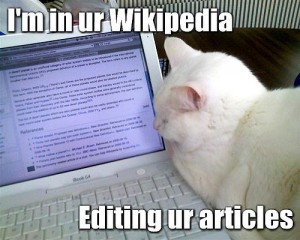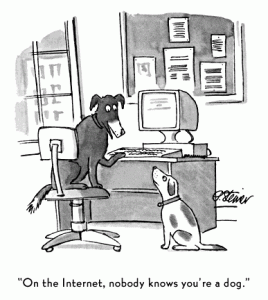I’ve been loathe to write anything regarding Proposition 8 because it is so personal and controversial an issue to many, myself included. Jose convinced me, however, that if we can’t talk about social issues on a sociology blog, then we’ve surely gone wrong somewhere. What follows are some of the questions about and objections to same-sex marriage that I typically get from students or colleagues, and my thoughts. Being that much of it is personal opinion, I gladly invite all intelligent discourse that follows.
Won’t allowing gay couples to wed make “a mockery of marriage” or in some way cheapen it for the rest of us?
I personally do not feel this is so, but people’s subjective reactions are not – or at least, should not be – at issue here (the issue, rather, is what is “right,” as elusive as that may be). Many people have been allowed to “sully” the institution without penalty – myself, I blame Elizabeth Taylor (and other celebrities of her ilk); Hollywood has made more a mockery of marriage than any homosexual I know. Indeed, one might reasonably suggest to simply remove the right to marry from anyone who has done so multiple times; that is, if you’ve already failed at being married (say, twice) and want to do it again, perhaps you shouldn’t be allowed the privilege. I don’t personally disagree with this recommendation; I just know better than to try and legislate it.
Who is making a mockery of marriage seems to be a fairly fluid concept historically, and the answer is nearly always driven by an underlying ideology that the group in question is not deserving of the same rights as others. Marriage may have suffered a number of insults at the hands of various peoples throughout time – everyone, apparently, from the Jews to the Blacks – but it nevertheless remains the overwhelmingly modal choice for Americans. The right to wed should not be denied to certain individuals because others do not care to belong to the same group as them (i.e., “married persons”). This is not equality or justice.
Is marriage even a right?
The 14th Amendment, section 1, promises that no State shall make or enforce any law which shall abridge the privileges or immunities of citizens of the United States; nor shall any State deprive any person of life, liberty, or property, without due process of law; nor deny to any person within its jurisdiction the equal protection of the laws. I don’t feel it’s a terrible stretch to imagine that these definitions of “liberty,” “due process,” and “equal protection” are meant to apply to gay Americans the same as anyone else.
In fact, Meyer v. Nebraska (1923) concluded that liberty “denotes not merely freedom from bodily restraint but also the right of the individual to contract, to engage in any of the common occupations of life, to acquire useful knowledge, to marry, establish a home and bring up children, to worship God according to the dictates of his own conscience, and generally to enjoy those privileges long recognized at common law as essential to the orderly pursuit of happiness by free men.” (see http://caselaw.lp.findlaw.com/cgi-bin/getcase.pl?navby=case&court=us&vol=262&page=399 ).
Isn’t Proposition 8 merely a “correction,” since Proposition 22 (defining the union of man and woman as the only valid form of marriage) was passed by a majority vote in 2000?
Can we and should we go against the “popular vote” when it comes to a civil rights issue? It was a four-to-three decision by Supreme Court Judges in May of this year that overturned Proposition 22, stating that all laws directed specifically against gays and lesbians were “subject to strict judicial scrutiny” and that marriage was a fundamental right under the California Constitution (see re Marriage Cases, http://www.courtinfo.ca.gov/opinions/archive/S147999.PDF). Proponents of 8 say, “see? The people spoke, but then a very biased set of judges decided it was okay for them to change things.” As it happens, that’s exactly what I hope our Supreme Court judges do. When they see a civil rights violation, they move to correct it.
Why do you keep talking about this as though it is a civil rights issue?
Take the following example: In 1958, a White man and a Black Woman were married; shortly afterwards, a grand jury issued an indictment charging them with violating Virginia’s ban on interracial marriages. They plead guilty and were sentenced to one year in prison, but the trial judge offered that they might forgo this punishment if they simply left Virginia and not return. He said,
“Almighty God created the races white, black, yellow, malay and red, and he placed them on separate continents. And but for the interference with His arrangement there would be no cause for such marriages. The fact that He separated the races shows that He did not intend for the races to mix.”
This sounds suspiciously familiar: simply replace the races with the genders, and voila! We have the familiar argument that God meant for men to marry women, and but for the interference with His arrangement, there would be no cause for such marriages.
Furthermore, had someone taken a popular vote at the time, they would have had no difficulty passing a Proposition in Virginia stating that the only recognizable form of marriage ought to be between Whites. This, however, did not sit well with a couple of Supreme Court judges, who in 1967, ruled that this decision – and indeed, Virginia’s policy of preventing marraiges between persons “solely on the basis of racial classifications” was “held to violate the Equal Protection and Due Process Clauses of the Fourteenth Amendment.” I’m sure this upset a number of people at the time, and went against the popular sentiment, but it was clearly the right thing to do (see Loving v. Virginia, http://caselaw.lp.findlaw.com/scripts/getcase.pl?court=US&vol=388&invol=1).
This decision was – amazingly – only 50 years ago now, but the people then were wrongheaded, uptight, and biased, and it required the unwanted interference of the law to contravene the people’s desires and set things right.
Massachusetts, of course, has already legalized gay marriage. In 2003, their Supreme Judicial court ruled that their state Constitution “affirms the dignity and equality of all individuals” and “forbids the creation of second-class citizens.” They felt that the state had no “constitutionally adequate reason” for denying marriage to same-sex couples on the ground of due process and equal protection (see Goodridge v. Department of Public Health, http://fl1.findlaw.com/news.findlaw.com/cnn/docs/conlaw/goodridge111803opn.pdf). This month, Connecticut will follow suit, having ruled in October that denying gays the right to marry was against the equality and liberty rules in the Connecticut state constitution, as well. I want no “second-class citizens” in California, either.
How do you know that allowing same-sex marriage won’t have destructive, far-reaching repercussions that we can’t possibly understand or predict?
It would certainly be interesting to look at the statistics regarding heterosexual marriage rates in Massachusetts since 2003 for a clue to our future; at this writing, the census information is available by written request (but not online). However, it is ethnocentric of us to forget that there are other countries than the U.S. in which same-sex marriage or partnership rights have existed for up to fifteen years. Studies regarding the impact of gay marriage in Scandinavian countries and the Netherlands, for example, have been conducted; one University of Massachusetts economics professor reports that previously existing trends in marriage, divorce, cohabitation, and out-of-wedlock childbearing did not change as a result. In fact, heterosexual marriage rates in Denmark increased after the adoption of same-sex marriage and are now the highest they have been since the early 1970s. Divorce rates remained the same in the countries studied. Further, the majority of families with children were headed by married couples (see http://www.aclu.org/getequal/ffm/section1/1c13slate.pdf and http://www.nytimes.com/2005/06/19/magazine/19ANTIGAY.html?pagewanted=all). Belgium, Canada, Norway, South Africa, and Spain have all legalized gay marriage; I suppose the eventual long-range impact of this decision remains to be seen, but we have no evidence thus far that these countries are suffering as a direct (or even indirect) result of it.
In my eyes, the bottom line is that it doesn’t matter what the repercussions might be. At one point in our history, the marriage of one black slave to another was not recognized – because they were lesser than us, we felt, and we had a right to decide whether or not their love for one another was sufficiently acceptable in the eyes of God (and Us). And I’m pretty sure that that’s wrong. We will not, I promise you, find ourselves in a world where everyone wants to be homosexual so desperately that human beings will cease getting married to members of the opposite sex and having children, thus threatening our very existence as a species. And short of that… I can think of no outcome that isn’t an acceptable consequence for providing equal treatment under the law.
God says homosexuality is wrong.
It seems clear to me that what this eventually amounts to, when distilled to its most basic level, is an attempt to force one’s religious beliefs on the rest of society. I know that it is naïve to imagine that we live in a country where Church and State are actually separate, but such a separation is nevertheless a stated goal of our Constitution. Yet if we surveyed proponents of Prop 8, it seems clear that the main reasons for its support would be based in conceptions of God’s will. Indeed, the LA Times recently reported that some 43% of the funding for Prop 8 came from Mormon donators, at the strong urging of the Mormon Church (see http://latimesblogs.latimes.com/lanow/2008/10/now-the-mormon.html). So we have people making civil rights decisions and impeding upon the freedoms of others based upon their religious convictions. I understand that to some degree, it becomes impossible to separate one’s belief system from one’s decision-making process, but this instance is neither subtle nor unconscious in nature.
The interesting thing to me about all of this is that people don’t have as firm a stance, as detailed a plan, or as vested an interest in how society ought to deal with the poor, the sick, or the hungry… yet there are hundreds of verses in the New Testament alone that explicitly talk about this. In contrast, there are only a handful of Bible verses that might conceivably be interpreted as relating in any way to homosexuality. So why is this issue at the forefront? And while people have ever pointed to the Bible as support for their discrimination against all sorts of groups of people, this is always the wrong decision.
I am not particularly religious, but I believe an appropriate verse might be Matthew 7:4, “how wilt though say to thy brother, ‘let me pull the splinter out of thine eye’ when a plank is in thine own?”





